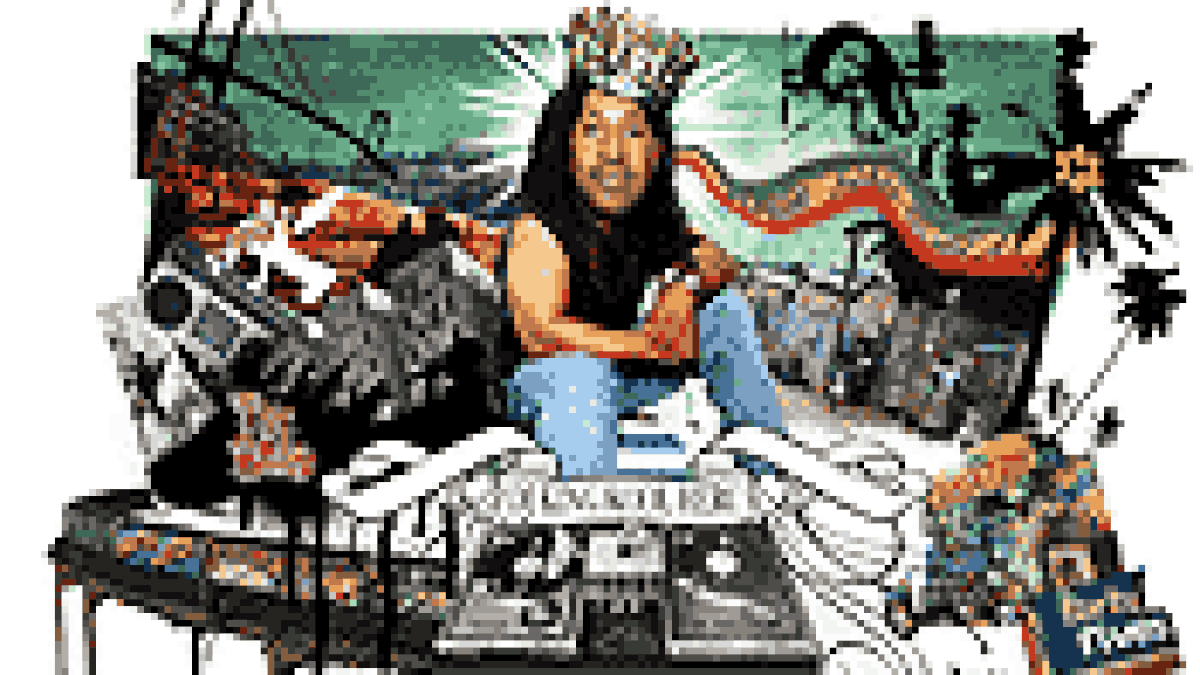It’s not every day you get to talk to the Creator. For a hip-hop fan, conversing with DJ Kool Herc — if not the spiritual father of hip-hop, then certainly a crucial messenger — is like riding shotgun with Jesus, breaking bread with Allah, or bowling with Buddha. Encountering Herc (aka Clive Campbell) is an enlightening, near-religious experience analogous to ancestor worship, with one key difference: The ancestor is still living.
Furthermore, he’s still spinning. Plenty of deified DJs have graced the booth at SF’s DNA Lounge over the years, but none has inspired as much out-and-out adulation as Herc did during one recent Friday night. Among the high-profile Bay Area wax spinners paying homage were D-Sharp (Quannum), J-Boogie (Dubtronic Science), and Q-Bert (Invisibl Skratch Picklz); J-Boogie in particular was reduced to a babbling idiot simply by virtue of sharing a room with Herc. “I’m kinda geeking on that shit right now,” he declared with a wide grin.
“The thing that should really hit home is, this is the guy that started it,” radio and Internet kingpin Davey D added. “We should celebrate.”
Indeed, Herc’s backstory is the stuff of myth, legend, and folklore, much of it detailed in Berkeley scribe Jeff Chang’s essential tome of hip-hop history, Can’t Stop Won’t Stop (the DNA gig, in fact, was a party to celebrate the book’s success). Chang recalls Herc’s youth in the same Trenchtown neighborhood as fellow Jamaican icon Bob Marley, and his rise to power in ’70s NYC as a house party DJ who understood the power of thunderous bass and rugged individuality.
“I was never trying to run with the crowd,” Herc insists on the phone from New York. Indeed, his two dominant cultural influences melded seamlessly — the longer you talk to Herc, the more a Jamaican accent creeps into his voice, and by the end of our thirty-minute conversation, it’s turned into a thick patois.
So instead of copying other DJs of that era, he adapted the Jamaican sound system ethos to the soul, funk, and jazz records popular among young Bronxites, using an echo chamber, a microphone, break records, and his own unerring party-rocking instincts. At that time, of course, he had no idea hip-hop would become as massively widespread as it is today — “I didn’t expect it to go this far,” he admits.
Still, it doesn’t much bother Herc that he never cashed checks like P. Diddy or became an A-list celebrity like Jay-Z. “I’m blessed,” he says humbly, and he’s still plugged in, too. “I still buy records. I can still walk around the community, ” he adds, reason being, he supposes, that “my parents raised me to respect people.”
Of course, the recent lack of respect in hip-hop gets Herc vexed these days. Part of the problem, he says, is that rappers are “storytellers” who haven’t necessarily lived the life they describe so graphically. He gives credit to Tupac for starting “that gangsta shit,” but notes that while many kids look up to rappers, “they’re only selling words as a product.”
That’s a common complaint, but Herc also is skeptical of so-called hip-hop activists, who “talk a good one,” but have been less successful, in his estimation, when it comes to producing meaningful results. “What do we have collectively?” he wonders. “We don’t have a hip-hop board of advisory. We don’t have a hip-hop committee.” If people really want to stop unnecessary violence, he says, there’s a simple solution: “Come and talk to these kids.”
And if you want to find those kids, find a Kool Herc party. The DNA’s stage was resplendent with toprocks, uprocks, headstands, headspins, footwork, b-boy stances, and freezes from a huge cipher that represented strong all night long. And while Close 2 tha Edge has seen many a breakdancing demonstration over the years, few of them had the inspired passion of this one: The breakers were clearly paying homage to their cultural hero, and Herc responded in kind with an unbelievable breakbeat set, including Jimmy Castor’s “It’s Just Begun,” Kool and the Gang’s “Who’s Gonna Take the Weight,” Babe Ruth’s “The Mexican,” and James Brown’s “Give the Drummer Some” (to name a few).
The cumulative effect had advanced hip-hop masters like Q-Bert bugging out on the dopeness of it all. “He was hitting all the breaks,” the crab-scratch guru notes with obvious awe. “I thought he was sick as hell. I would like to interview him, just to be in his presence.”
Two hours into his set, Herc was still going strong: “We’re having a real jam right now in San Francisco,” he declared, adding, “Y’a-ight? I’m loving it. I’m feeling it!” before segueing into Digital Underground’s “Humpty Dance,” followed shortly thereafter by a dubbed-out remix of Grandmaster Flash’s “The Message,” complete with melodica. He was still on the tables when C2tE left sometime after 3 a.m. — the last thing I remember him playing is James Brown’s “Sex Machine,” a statement of stamina and longevity if there ever was one.














